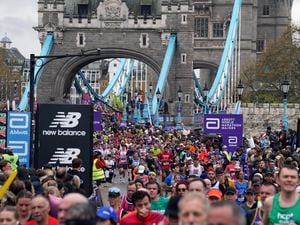Jeff Wayne talks about bringing War of the Worlds to Birmingham stage
From a sci-fi novel to stage phenomenon, The War of the Worlds is back in Birmingham this year. We chat to its creator Jeff Wayne . . .
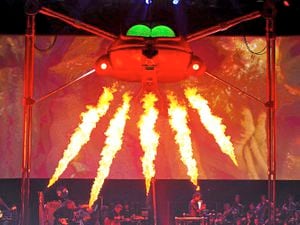
It’s a story that features some of the greatest stars of all time and encompasses era-defining events. Jeff Wayne’s The War of the Worlds came about because of one man’s determination to create a masterpiece – even if that meant risking everything. And such was the quality of his re-imagination of HG Wells’ masterpiece about a conflict between mankind and an extraterrestrial race that it became one of the top 40 albums ever in the UK, with sales of more than three million.
Featuring a starry cast including A-Lister Richard Burton along with David Essex, the late, great Phil Lynott, Justin Hayward, Julie Covington and more, The War of the Worlds was the cult hit that penetrated the mainstream and became ubiquitous. Subsequent versions featured Liam Neeson, Marti Pellow, Jason Donovan, Russell Watson, Gary Barlow, Kaiser Chiefs frontman Ricky Wilson and more.
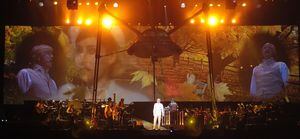
And this year, a major arena tour is planned to mark the 40th anniversary of its creation. It will visit Birmingham’s Genting Arena on December 8 for a spectacular show.
Jeff has been putting the show together for some time, making sure that it’s the biggest and best it’s ever been. He didn’t imagine The War of the Worlds would be as enduring as it has been. “Well, we’re thrilled that we’re celebrating the 40th anniversary. That’s really special. Not many pieces of music stick around for as long as that. But it’s always been so popular with the fans and we’re really thrilled to be able to mark the date this autumn. We’re working on the show and it’s going to be something special.”
Jeff has led a remarkable life. Though he’s always been the quiet one, the man behind the desk, the man at the controls, his story is more remarkable than those of many of his stars. His father was a major star in the USA and Jeff practically grew up on the stage.
Born in Queens, in the States, he played in local bands as a kid and attended journalism school. His father, Jerry, was a huge influence. He had been a big star in the USA – at one stage, featuring on the cover of Billboard magazine and later taking over a radio programme from Frank Sinatra. Jerry was blacklisted during the McCarthy era, which ruined his career and led his family to England.
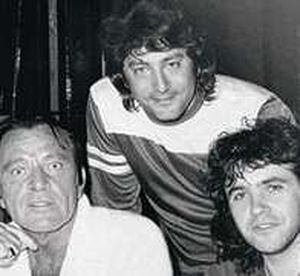
Jeff remembers: “In early 1957, Joseph McCarthy died, officially from acute hepatitis although it was widely believed downing a quart of liquor a day hadn’t helped. Near the end of his life, McCarthy was also reported appearing ‘in a trance’, unable to recognise familiar faces or form intelligible words. It seems he also came to rely on morphine.
“To the day my father passed away in September, 1996, Joseph McCarthy was someone he rarely spoke about. Years later after I married, if ever asked by my wife Geraldine or our children, he’d put McCarthyism and blacklisting more into its historical perspective, including the excesses achievable by a politician left to ‘rant’, and the impact he had on all those who lived through this dark period in the United States. But always without anger.
“As far as I was concerned, the Senator’s passing was good riddance to a bad man. And I say that with anger. While McCarthyism died with the Democrat turned Republican Senator, today there are many issues in the United States still cropping up that one might suggest the ghost of Joseph Raymond McCarthy still remains. Fake news perhaps?”
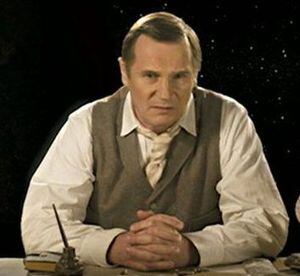
When the Wayne family landed in the UK, they moved into palatial accommodation in the centre of town and Jeff’s career began. He started writing music for TV commercials, becoming enormously successful.
“That was a crazy time for me, with the volume of new work never letting up. I was truly fortunate to be making my way in a very competitive and creative industry in one of the world’s great music centres where the arts flourished and the standards were extremely high.”
And then he created his masterpiece.
Even now, he accepts that it’s remarkable that The War of the Worlds was a hit. “It never really should have succeeded.
“It was a continuous piece, nearly two hours in length over four sides of vinyl, with an actor portraying a journalist recounting his story of survival during a Martian invasion in Surrey, England, at the height of the British Empire, with songs, themes and sounds that weave in and out. Come on, it had to be a freakin’ freak of nature. Didn’t it?
“And it was released in the middle of the punk and disco wars, with elements of prog rock and electronic music threaded through an old school musical format. It also entwined elements of classical and dashes of pop and was a sprawling, mega-ambitious creation.”
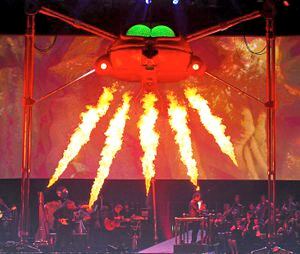
Jerry, Jeff’s father, was central to the story. The script, adapted from HG Wells’ novel, was written by Jerry’s second wife, the author and journalist, Doreen Wayne.
Based on a dark Victorian tale, the musical had a social and political undertow while its enthralling narrative and exotic musical journey featured an eclectic mix of performers and musicians.
Jeff says: “It was released in June 1978 and arrived after I’d spent a decade working behind the scenes. I was a traditional ‘back-room’ boy in pop music and media projects having composed, arranged, conducted and produced more than 3,000 productions, as well as recording and working live with David Essex.
“The album was the summation of my life up to that time. There were strands of my showbiz upbringing in the scale and ambition of the work but I also had the angst of youth.
“TWotW became the perfect vehicle for me to express myself fully and create the a musical interpretation of HG Wells’ brilliant and visionary story. It was brought up-to-date with a swirling steam punk atmosphere and sound track.”
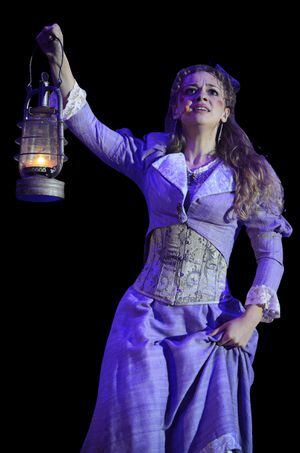
The record became a huge success – though not all of its stars were aware of its impact. Richard Burton, in fact, was oblivious to its success.
After returning from a trip to New York, Jeff took a phone call from Suzy Burton, who was then Richard’s wife.
“They had just returned to London following a visit to see his family in Neath Port Talbot, where he had been raised from the age of two. She told me that Richard didn’t know that TWotW had been released about 10 months earlier, and more importantly had no idea how popular it had become until they arrived in Wales, when many family and friends had copies and they all wanted him to sign theirs.
“She then asked if I could join her and Richard for a cup of tea at The Dorchester Hotel, where they were staying. I was happy to and looked forward to catching up with them, especially given that Richard was aware of the great success TWotW was having and the recognition he had received.
“We confirmed for a few days later, and spontaneously I also asked if I could bring a photographer for a few minutes, as I knew CBS had a pile of gold and platinum disks for Richard which I could present to him. I thought he’d say no way, but instead, he was enthusiastic. CBS sent a photographer to meet us at The Dorchester where Richard and Suzy had a beautiful suite including a balcony over-looking Hyde Park where some of the pictures were taken.
“I always remember Richard commenting – ‘I’m a pop star now!’ Considering he had seven Oscar nominations and won awards for his stage performances and dramatic readings, I was very moved that he now included TWotW within his considerable career achievements. In fact, The Richard Burton Museum now includes a presence for his work on the recording.”
Richard wasn’t the only key to The War of The Worlds’ success. The involvement of David Essex was also vital. David was one of the biggest pop stars in the UK, a man who sold records by the million and enjoyed huge chart hits.
“I met David when he was appearing in Godspell, at Camden Town’s Roundhouse, in late 1971, before transferring to the West End’s Wyndham Theatre from January, 1972.
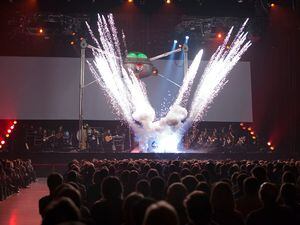
“I was going out with Liz Whiting, a dancer/actress/singer I met in Two Cities and who was understudying Godspell’s female leads. I’d often watch the show, go out for meals afterwards with Liz and others from the cast, especially David, Julie Covington and Marti Webb. That led to us becoming friends and eventually singing on a number of my sessions.
“They were asked to front what became known as The Godspell Band, which due to the show’s popularity, a number of London’s leading clubs were interested to book. While David, Julie and Marti were very keen, the show’s band wasn’t available. So I agreed to become the band’s MD/arranger/keyboardist. I brought in a drummer and bassist and we rehearsed at my house. The band was largely built around David’s lead vocals, with Julie and Marti on harmonies plus occasional leads on other songs shared between them.
Our first booking was the very ‘in’ Scotts of St James. Our set opened with the high energy Lennon-McCartney/Beatles song, She Came In Through The Bathroom Window. We were confident and raring to go, until we arrived at Scotts only to learn that Paul and Linda McCartney, plus Denny Laine from their band Wings, had booked a front row table.
“Talk about a baptism of fire; David and I were at the bar within seconds, downing a couple of whisky shots, and while we got through the set with the crowd loud and responsive, I don’t recall much else and I think I left through the bathroom window.”
Further encounters with the entertainment world’s A-List followed as The War of the Worlds led to a subsequent project: Jeff Wayne’s Musical Version of Spartacus. It featured Anthony Hopkins and Catherine Zeta Jones, among others.
“I wound up with the right record company with the most talented performers led by Anthony Hopkins as the Roman Senator, Marcus Crassus, Catherine Zeta Jones as Palene, the woman of Spartacus, and Ladysmith Black Mambazo representing the enslaved Africans captured by the Romans. I couldn’t have hoped for better, along with brilliant musicians, certainly equal to The War of The Worlds.”
Away from large scale musicals, Jeff’s TV music continued to live on. There was a Gordon’s Gin commercial that was covered by The Human League while he also composed numerous well-known television themes, including Good Morning Britain (TV-am), ITV’s The Big Match and World of Sport, BBC’s Sixty Minutes, and for 24 years, the UK’s first news radio station, LBC.
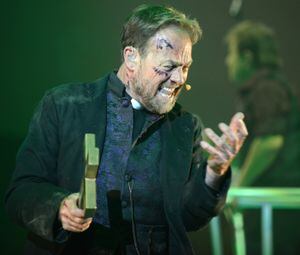
“In 1980 my Gordon’s music went on to be recorded by Human League as one of the tracks on their debut album ‘Travelogue’. Their recording was first class and produced by Martin Rushent who just happened to be the tape operator on many of my early recordings including . . . Gordon’s Gin.
“Martin went on to become a great engineer and producer of bands like The Stranglers, The Buzzcocks, XTC, Generation X, the Go-Go’s and Altered Images, and had his own label and studio outside of London. I last saw Martin in Birmingham at the NEC in 2007 when he came to see The War of The Worlds as part of our arena tour.”
The story has continued in recent years.
When in the summer of 2005 The War of the Worlds was re-released, it spent 10 consecutive weeks in the Top 10 of the UK Album charts. And a semi-regular arena show has sold hundreds of thousands of tickets as fans have flocked to get their fix.
“It’s a story that hasn’t yet ended,” adds Jeff.
As the great man himself said on the record: no-one would have believed.
About the book. . .
English writer HG Wells created the stunning science fiction novel The War of the Worlds in 1897. It was serialised by Pearson’s Magazine in the UK and Cosmopolitan in the USA and was among the first novels that focused on an imagined conflict between humans and aliens.
Since being published as a novel in 1898, the book has never been out of print and it has spawned half a dozen feature films, radio dramas, Jeff Wayne’s musical interpretation and a number of sequels, comic books and more.
The book became redolent of the phrase ‘life imitating art’ when it inspired the scientist Robert H Goddard to invent the liquid-fuelled rocket and the multi-stage rocket, which resulted in the Apollo 11 Moon landing some 71 years later.
The story focuses on the way in which aliens from Mars plot an invasion of Earth to replenish their limited resources – and the battles that ensue.





